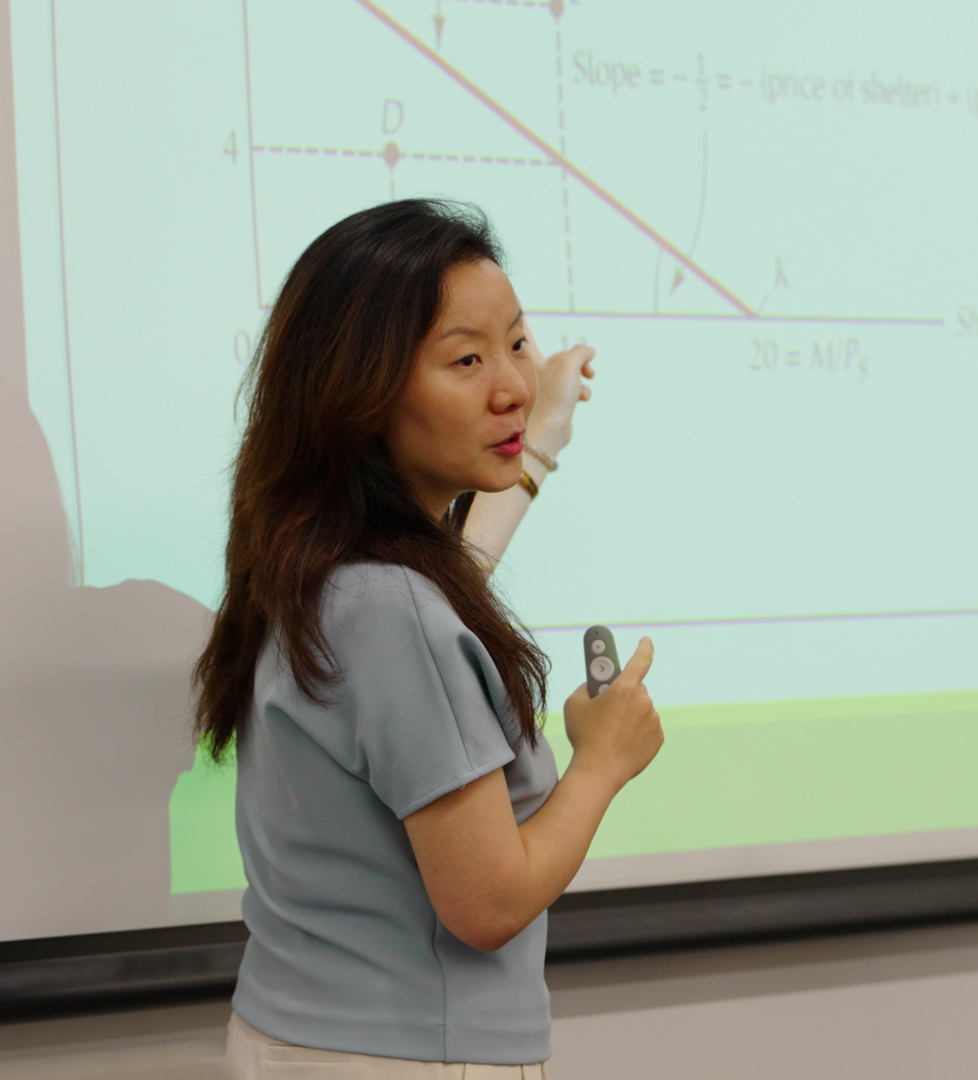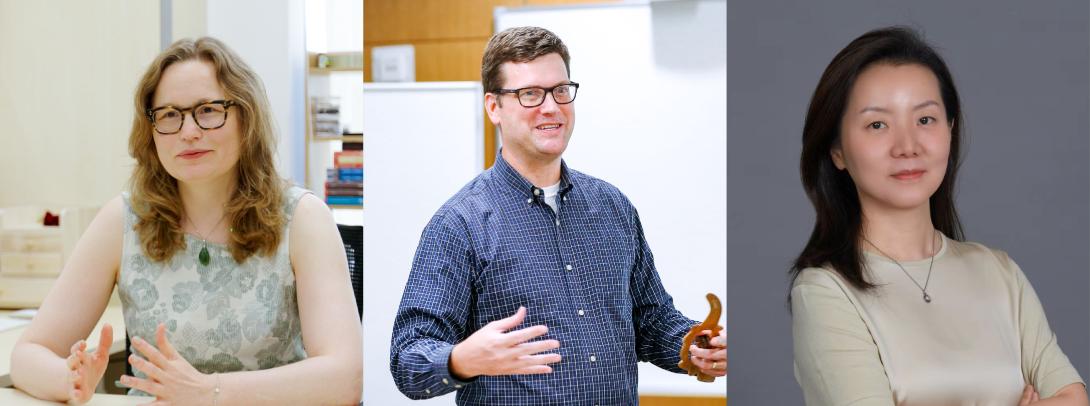NYU Shanghai will honor the recipients of the University’s Teaching Excellence Award (TEA), 2022-2023 recipients Steve Iams and Weng Weiwei, and 2021-2022 inaugural award recipient Lena Scheen, in a ceremony on September 22. Melanie Hackney, chair of 2022-2023’s TEA selection committee, said that the awardees were chosen because each demonstrates the engaging and dynamic classroom environment that NYU Shanghai strives to offer its students. As China's Teacher's Day approaches, the honorees reflect on the lessons they’ve learned over years of honing their craft. There is no one single formula for a great teacher, they say, but teachers must find their own style to create a nurturing academic environment for students.
Encouraging Interaction

Weng Weiwei joined NYU Shanghai after teaching for seven years at the School of Business at Hong Kong Baptist University. “Teaching the students is my top priority,” says Weng, who currently serves as an associate professor of practice in Economics, and the Undergraduate Coordinator of Economics. She immediately noticed the difference in NYU Shanghai students. “After the first lecture, they were already [coming] up to me asking questions, questions, questions,” she says. “They would proactively take the initiative to reach out and make an appointment with me.”
Those individual interactions with students are what inspired her to develop her teaching techniques. In her Microeconomics class, she deliberately encourages interaction between students, both in and out of class. “I want them to be more willing to think and engage in every step of the learning, to open themselves up to this learning process without feeling [they’re] being judged,” she says. “It's more about whether or not you come prepared and contribute to meaningful in-class interactions… that can benefit everyone,” she says.
What impressed the selection committee was Weng’s “ability to seamlessly guide students to use what they have studied in class to understand and anticipate new concepts,” said Hackney. “She used group work and activities to reinforce the class content, encouraged participation from all students, and fostered critical thinking throughout her lessons.”
Critical thinking has become an important concept for her to share with her students. “A lot of times it’s not about answers, it's about the questions,” she says. “We try to make it clear why we ask certain questions and how to reframe the questions, because asking questions logically and carefully itself effectively helps reveal the right answers. .”
Weng says her mentors in Hong Kong showed her by example how important it is to show respect to students. “I just remind myself these are very much unique human beings in front of me,” she says. “It's really our privilege to teach them. That is why whenever they come to me with whatever minor questions regarding the course materials or not, I always carefully address their concerns.”
Weng said that being honored with the Teaching Excellence Award has motivated her to continue to learn and grow as an educator. “I have to say this recognition is very much encouraging to me,” she says. “I want to keep revising or developing my own teaching practice.” There’s one thing she won’t change though. “I keep my door open [for students] whenever possible,” she says. “It's always open.”
Watch a video honoring TEA Awardee Weng Weiwei.
Participatory and Experiential Learning

Steve Iams came to NYU Shanghai from a long career that has included coaching, teacher training,, and serving in the Peace Corps. At NYU Shanghai he put all those lessons into practice as Clinical Associate Professor of English for Academic Purposes faculty and has designed several courses, including Language and Power, which incorporates volunteer English teaching as a part of the course.
Reaching your students starts from the smallest details, he says, including how the chairs are arranged in the classroom. “My classes are language focused. I think they're not going to benefit if I’m the one doing all the talking,” he says. “Something as simple as how the furniture is arranged can be significant in terms of how the discourse of the classroom unfolds.”
Iams says that he wants to create a learning environment that may be very different from what his students have experienced before. “We strive to, at a certain point, put the students in charge of their own learning,” he says. But, he adds, he’s also modeling to his students effective ways of engaging with each other in class, using a variety of activities and discussion formats. “I’m leading those discussions, I’m facilitating, I’m setting up the activity, but I’m also telling them, at a certain point, you’re going to be leading the class.”
In his On the Border class, Iams asks his students to choose a topic that relates to the theme of borders, select reading sources, and lead their classmates in discussion, as if they were the teacher. “I want students to think of themselves as multilinguals and not as deficient English speakers,” he says. “Not only do they speak Chinese, but they're operating at a level of English that’s very high and they also have other languages that they speak. It’s a way of affirming their identities.”
Iams’ teaching style reflects a strong focus on fostering self-directed and experiential learning, an effective strategy to maximize student engagement and success, said Hackney, one of the committee members who selected Iams for the TEA award. “Steve's teaching demonstrated the ability to do this seamlessly throughout the lesson, with a clear passion and comfort that creates a comfortable and safe environment for students to pose challenging questions, share their views, and engage in respectful but productive debate,” she said.
Iams says winning the TEA award at NYU Shanghai is special. “It's a place where there are many outstanding teachers, who I learn a lot from in every meeting [and] in every conversation,” he says. “To be named as an excellent teacher at a place that values teaching really means a lot.”
Watch a video honoring TEA Awardee Steve Iams.
Finding Your Own Style

Prior to joining NYU Shanghai, Assistant Professor of Global China Studies Lena Scheen taught at Leiden University and the University of Amsterdam. “I come from an old-fashioned European university where in my undergraduate years you sat in class and the professor held a lecture, you took your notes, you went home,” she says. With very little experience with participatory learning as a student, she found she had to adapt her own style for NYU Shanghai, where teaching, research, and service are all valued. “You learn to become a better teacher by your students, because every class is different,” she says.
She believes that educators need to find their own style. “I love lecturing. I'm good at it,” she says, “but I really think that every professor should teach in their own way.” Giving lectures is energizing for her, she says, but she acknowledges that not every professor feels that way. During the COVID pandemic, Scheen recorded her lectures in an image-heavy slideshow format for her students and received positive feedback from her students. “I think they can really focus on images and just my voice, then they could re-listen to it.” With students accessing her lectures outside of class, Scheen says she was able to use class time for more dynamic group-based discussion.
In her Chinese fiction class Shanghai Stories, Scheen teaches her students how to use fiction as a historical source in research, while introducing Shanghai’s culture and history through literature. “With literature, the nice thing is there is never one right answer,” she says. “So that makes it all the more interesting to hear all these very different views of students.”
Because her classes are centered around Shanghai, she often takes the opportunity to get out of the classroom and lead her students on walking tours of the city that relate to the texts they read in class. For her class Global Connections: Shanghai, she takes the students around the city, including gentrified neighborhoods. “Very often when they [visit a place we discussed in class] they might change what they thought about this topic [and] when they actually see it in practice, it might actually deepen their insights,” she says.
Scheen says that peer learning with her fellow faculty members at NYU Shanghai has been crucial to her development as an educator. “When we talk about our teaching, we talk about the successful things, the fun things. I think we should be more open about challenges,” she says. “We're all inventing the wheel by ourselves, so I think that when things don't go well, those peer experiences are even more important [to share].”
Hackney, who served on the 2021-2022 TEA selection committee, said Scheen’s knowledge and passion are evident in her teaching. “She provides engaging points of entry for students to explore topics and is excellent at facilitating discussion,” she said. “Her questions to students guide them to think critically and she makes literature accessible and exciting by creating multiple access points that relate to students’ lives and helps them arrive at a deeper understanding of the text.”
Scheen, who has been teaching at NYU Shanghai since 2013, says that receiving last year’s Teaching Excellence Award felt gratifying. “I'm really happy that at NYU Shanghai they appreciate teaching, because I do put a lot of energy and time into it, and it is really rewarding,” she says. “You don't feel like, ‘I'm doing this just for myself or just for my students.’ It's actually being seen and recognized [by the University].”
Watch a video honoring TEA Awardee Lena Scheen.


